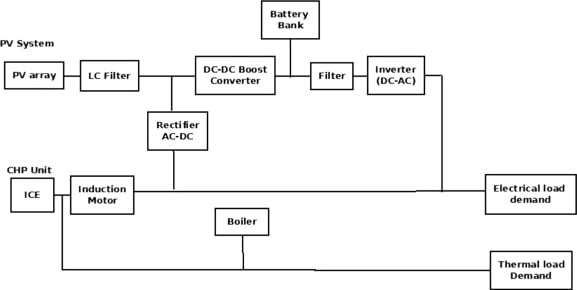
The technological development and economic of scale for solar photovoltaic (PV), batteries and combined heat and power (CHP) have led to the technical potential for a mass-scale transition to off-grid home electricity production for a significant number of utility customers. However, economic projections on complex hybrid systems utilizing these three technologies is challenging and no comprehensive method is available for guiding decision makers. This paper provides a new method of quantifying the economic viability of off-grid PV+battery+CHP systems by calculating the levelized cost of electricity (LCOE) of the technology to be compared to centralized grid electricity. The analysis is inherently conservative as it does not include the additional value of the heat form the CHP unit. A case study for residential electricity and thermal demand in an extreme worst case environment (Houghton, Michigan) is provided to demonstrate the methodology. The results of this case study show that with reasonable economic assumptions and current costs, PV+battery+CHP systems already provide a potential source of profit for some consumers to leave the grid. A sensitivity analysis for LCOE of such a hybrid system was then carried out on the capital cost of the three energy sub-systems, capacity factor of PV and CHP, efficiency of the CHP, natural gas rates, and fuel consumption of the CHP. The results of the sensitivity provide decision makers with clear guides to the LCOE of distributed generation with off-grid PV+battery+CHP systems and offer support to preliminary analysis that indicated a potential increase in grid defection in the U.S. in the near future.
Keywords[edit | edit source]
Photovoltaic; Cogeneration; Off-grid; Combined heat and power; Levelized cost of electricity; Battery; Storage
System set up[edit | edit source]
See also[edit | edit source]
- Performance of U.S. hybrid distributed energy systems: Solar photovoltaic, battery and combined heat and power
- Review of solar levelized cost
- PV and CHP Hybrid System
- Hybrid photovoltaic-trigeneration systems
- Simulations of Greenhouse Gas Emission Reductions from Low-Cost Hybrid Solar Photovoltaic and Cogeneration Systems for New Communities
- Emerging economic viability of grid defection in a northern climate using solar hybrid systems
- The Potential for Grid Defection of Small and Medium Sized Enterprises Using Solar Photovoltaic, Battery and Generator Hybrid Systems
- Photovoltaic plus combined heat and power
- PV and CHP Literature review
- Policies to Overcome Barriers for Renewable Energy Distributed Generation: A Case Study of Utility Structure and Regulatory Regimes in Michigan
- Examining interconnection and net metering policy for distributed generation in the United States
- Economic viability of captive off-grid solar photovoltaic and diesel hybrid energy systems for the Nigerian private sector
- HOMER
- Decentralized Renewable Hybrid Mini-Grids for Rural Communities: Culmination of the IREP Framework and Scale up to Urban Communities
- Energy Policy for Energy Sovereignty: Can policy tools enhance energy sovereignty?
- The energy crises revealed by COVID: Intersections of Indigeneity, inequity, and health
- A review of the value of solar methodology with a case study of the U.S. VOS
- Economics of Grid-Tied Solar Photovoltaic Systems Coupled to Heat Pumps: The Case of Northern Climates of the U.S. and Canada
- Decarbonizing rural residential buildings in cold climates: A techno-economic analysis of heating electrification
- Demonstration of the integrated rural energy planning framework for sustainable energy development in low-income countries: Case studies of rural communities in Nigeria
- Strategic Investment in Open Hardware for National Security
- Open source decarbonization for a sustainable world
- Can grid-tied solar photovoltaics lead to residential heating electrification? A techno-economic case study in the midwestern U.S.
- Economics of Open-Source Solar Photovoltaic Powered Cryptocurrency Mining






